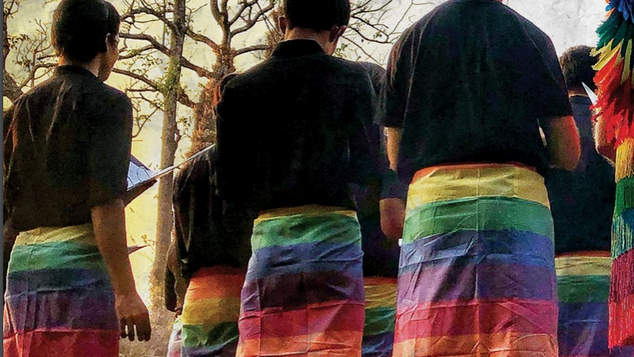
Like many other transgender women in Myanmar, Alinkar and her friends work as makeup artists. In November 2016 during the cool season, they were traveling by motorbike to a client, to do makeup for a night-time Buddhist ritual, when they were stopped at a police checkpoint.
Alinkar recounted her experience in a new report highlighting discrimination and injustice faced by LGBTIQ+ people in Myanmar.
“The police asked us where we were going, but before we could answer, they were hitting us. They forced us to kneel with our hands behind our heads. They falsely accused us of dealing drugs and mocked us for being transgender.
“An officer derisively asked whether my friends and I are men or women. When we said that we are transgender, the police kicked us brutally. A police officer asked me if parts of my body were fake. When I said my body is real, the
officer kicked me again and demanded oral sex.”
When Alinkar refused, she was subjected to further abuse. The women were released only after their make up client arrived to help them. Due to their well-founded fear of retaliation, Alinkar and her friends never complained to the authorities about this incident. Memories of this traumatic evening still haunt Alinkar. She noted, “to this day, I feel scared.”
Alinkar’s experience is just one of many that are featured in a new report that calls for the government of Myanmar to remove the British colonial era laws that criminalise homosexuality and lead to discrimination against LGBTIQ+ people in the country.
The Denmark-funded report titled In the Shadows calls on the country’s first democratically-elected government in decades to scrap Section 377, which punishes gay sex with up to 10 years in prison. Like many countries that were once part of British empire the law is number 377, just as it was in India, as it is in Malaysia, while in Singapore the law outlawing homosexuality is 377A.
Myanmar’s leader Aung San Suu Kyi voiced support for decriminalising homosexuality when she was in opposition, but since coming to power she has done little to change the laws.
Myo Nyunt, a spokesperson for Aung San Suu Kyi’s National League for Democracy, told Al Jazeera the party had “no intention” of overturning Section 377 and had to be “very careful” in the run-up to next year’s election.
“The opposition might use it to attack us,” he told Al Jazeera. “They have formerly accused the NLD of being a non-religious party and of giving special favours to groups who want … freedoms just like the Western societies.”
The report highlights that LGBTIQ+ people face discrimination by police who use a wide range of laws to arrest and detain people including charging transgender women as “being in disguise”.
Additionally the police often rely on a series of laws referred to as the ‘darkness laws’ or ‘shadow laws’ that allow them to arrest and question anyone who found outside between sunset and sunrise. Many of the people interviewed for the report shared that these laws are often cited when harassing members of the LGBTIQ+ communities.
The ‘shadow laws’ cite a wide range of reasons that people may be stopped and arrested by police including carry any implement that could be used to break into a dwelling, being in disguise, or not being able to provide a reputable account of why you are in the area. The laws allow people to be arrested without a warrant, and imprisoned up to three months.
The authors of the report argue that Myanmar is not meeting its obligations to international human rights agreements it has signed up to. Highlighting that Myanmar’s laws are almost identical to those declare unconstitutional in India, the authors say the country is failing to meet the obligations of multiple international agreements.
The Indian Supreme Court underscored that Section 377 contravened the rights to privacy, equality, non-discrimination and dignity, which were enshrined in international human rights treaties binding on India. These include the International Covenant on Civil and Political Rights and International Covenant on Economic, Social and Cultural Rights.
The Indian Supreme Court also noted that the Yogyakarta Principles on the Application of International Human Rights law in relation to Sexual Orientation and Gender Identity affirming the conclusion that criminalizing consensual same-sex sexual conduct violated fundamental rights. The authors of the report argue that the same finding should apply to Myanmar.
Many of the people interviewed for the report shared stories of how police officers sometimes use the laws against homosexuality to blackmail people or force them to perform sexual acts.
A gay man named Htet Zaw spoke of how a male police officer threatened him with pressing charges under Section 377 in 2010.
Htet Zaw had flirted with this man before realizing he was a police officer. Htet Zaw recounted how the officer had revealed that he was a member of the police by showing him his identification card.
According to Htet Zaw, the police officer then abused his position and extorted money and non-consensual sexual acts from him. While the police officer did not explicitly refer to Section 377, he told Htet Zaw “I know you are gay
and you have homosexual sex”, and suggested that Htet Zaw had better submit to his demands.
As a result, Htet Zaw was both sexually assaulted and forced to pay his assailant, the police officer, the money he had demanded.
The report lists a series of steps Myanmar could take to improve the lives of LGBTIQ+ people.
Removing the laws against homosexuality, introducing anti-discrimination legislation, provide legal recognition of transgender people, removing vague laws, providing sensitivity training to police, and making a committment to investigate crimes committed against LGBTIQ+ people are just a few of the suggestions.
OIP Staff





